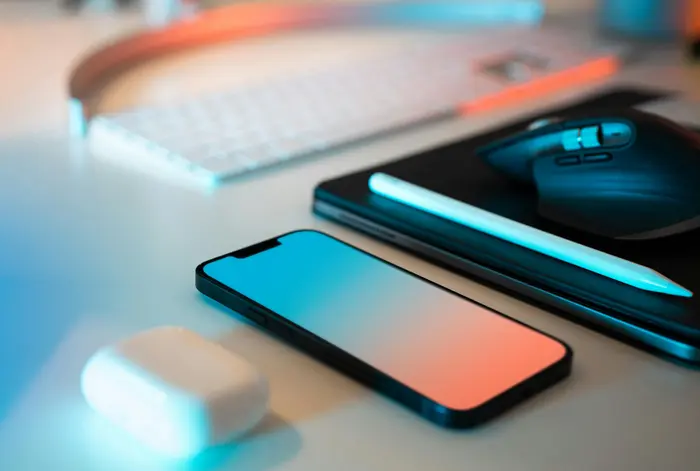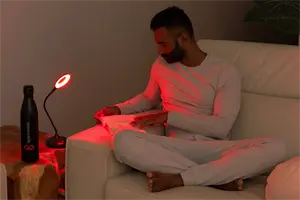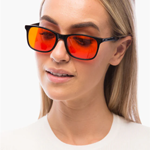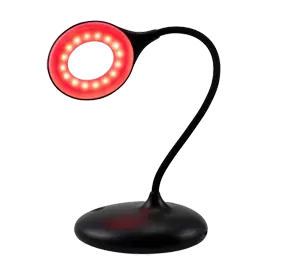This post contains affiliate links. Read my full diclosure HERE.

In today’s technology-driven world quality sleep is more crucial than ever for maintaining overall health and well-being. However, the pervasive use of digital devices has introduced a new challenge: increased exposure to blue light, which has an enormous impact on our rest that we are often not aware of. It is well known, my personal experience included, that just one night of poor sleep significantly affects mood and energy the next day.
Prioritizing and improving sleep should be among the first steps to living a healthier, thriving life.
What’s the Deal with Blue Light?
Blue light is a high-energy visible light that’s part of the light spectrum. Natural sources of blue light, like the sun, play a crucial role in our daily lives. For instance, bright morning sunlight helps us to kick-start the day by boosting alertness and energy levels. It signals to the body that it’s time to wake up and be active.
However, blue light isn’t just limited to the sun; we’re surrounded by artificial sources of blue light too. All the screens from our devices – smartphones, tablets, computers, and even LED lights – emit blue light, and while they’re incredibly useful, they can also interfere with our sleep patterns. The blue light from these screens tricks the brain into thinking it’s still daytime, which can mess with the body’s production of melatonin, the hormone that makes you feel sleepy.
While natural blue light from the sun helps regulate our sleep-wake cycle and boosts alertness during the day, excessive exposure to artificial blue light, especially during evening hours, can negatively impact our sleep. Understanding this difference is key to managing blue light exposure.
The Impact of Blue Light on Sleep
Blue light exposure affects our circadian rhythm, which is basically our body’s internal clock that tells us when to be awake and when to sleep. When we get natural blue light from the sun during the day, it helps keep this clock in sync, making us feel alert and awake.
Research has shown that exposure to blue light before bed can suppress melatonin production, making it harder for us to fall asleep. This disruption can lead to various sleep problems. You might find yourself struggling to fall asleep, waking up multiple times during the night, or feeling tired and groggy in the morning even if you think you got enough sleep. Over time, these sleep issues can build up and affect your overall health and well-being.
Digital Age and Increased Blue Light Exposure
Living in a digital age, our exposure to blue light has dramatically increased. We are more connected than ever before. From checking emails on our phones first thing in the morning to watching Netflix on our tablets before bed, screens have become a huge part of our daily lives.
According to reports, the average American spends more than 11 hours a day interacting with media, much of it on digital devices . And it’s not just adults who are glued to their devices – kids and teenagers are also spending more time than ever in front of screens, whether it’s for school, gaming, or social media.
Studies have shown a direct link between increased screen time and sleep problems. All that blue light is telling our brains to stay awake, even when we should be winding down for the night, resulting in shorter sleep duration and poorer sleep quality.
While our digital devices are incredibly useful and often entertaining, they also come with the downside of increased blue light exposure. Being aware of this and understanding how it affects our sleep is the first step towards making healthier choices for better rest in our connected world.
How Much is Too Much?
How much blue light you’re actually being exposed to, and how can you tell if it’s affecting your sleep?
First, think about your daily habits. How much time do you spend on your phone, computer, or tablet? If you’re like most people, it’s probably a lot. From work or school tasks to social media scrolling and binge-watching shows, these activities add up quickly. Pay attention to when you’re using these devices too – are you on your phone right before bed?
Next, look around your environment. Lighting at home, especially LED light bulbs, also emits blue light. What kind of lighting do you have in your bedroom?
Watch the signs and symptoms that blue light is interfering with your sleep, such as difficulty falling asleep, frequent nighttime awakenings, and feeling tired despite getting enough sleep. If you notice that your sleep quality improves when you cut down on screen time before bed, that’s a pretty clear indicator that blue light was the culprit.
To get a better handle on your blue light exposure, you can also use some tools and apps. There are apps available that track your screen time and even tell you how much blue light your devices are emitting. Some fitness trackers and smartwatches can monitor your sleep patterns, giving you insights into how your habits are affecting your rest.
By assessing your blue light exposure, you’ll start to see where you can make changes. Understanding your habits and their impact on your sleep is the first step towards better rest. Whether it’s cutting back on screen time before bed, adjusting your lighting, or using blue light filters, these small adjustments can make a big difference in improving your sleep quality.
Practical Tips for Better Rest in a Digital Age
Here are some practical, effective, and easy tips to manage your blue light exposure and get better rest.
Adjusting Device Settings
Most smartphones and computers have built-in features to reduce blue light. These are often called night mode or blue light filters. Turn these on to reduce the amount of blue light your screens emit, especially in the evening.
You can also manually adjust your screen’s brightness and color temperature. Warmer tones are easier on your eyes and less disruptive to your sleep.
Using Blue Light Blocking Tools
Blue light blocking glasses are a great investment if you spend a lot of time in front of screens. They’re designed to filter out blue light, making it easier on your eyes and helping you wind down for sleep.
There are also screen protectors for your devices that block blue light. These can be a convenient option if you don’t want to wear glasses.
Limiting Screen Time Before Bed
Try to establish a screen-free routine at least an hour before bedtime. This can help signal to your body that it’s time to start winding down. Instead of scrolling through your phone, consider reading a book, meditating, or taking a warm bath.
Setting a consistent bedtime can also help regulate your circadian rhythm. Going to bed and waking up at the same time every day (even on weekends) can improve your overall sleep quality.
Optimizing Bedroom Lighting
In the evening, switch to warm, dim lighting. This can help your body start producing melatonin and prepare for sleep. Avoid using bright LED lights in your bedroom.
It is worth investing in a high quality Blue Light Blocking Lamp from BON CHARGE.
Also, consider using a salt lamp or other low-light alternatives that are easier on your eyes. Even something as simple as dimming your lights in the hours leading up to bedtime can make a big difference.
Increasing Daytime Natural Light Exposure
Spending time outdoors during the day helps regulate your circadian rhythm and improves sleep quality. Try to get some sunlight in the morning, whether it’s taking a walk or just sitting by a window.
During the day, keep your living space bright and airy. Open blinds and curtains to let in natural light. This exposure to natural blue light during the day will help you feel more awake and alert.
Conclusion
Managing blue light exposure is crucial for getting a good night’s sleep in our digital age.
By understanding how blue light affects your circadian rhythm and implementing practical tips like adjusting device settings, using blue light blocking tools, and optimizing your environment, you can improve your sleep quality.
Remember, small changes can make a big difference. Prioritizing sleep will not only enhance your mood and energy levels but also contribute to your overall health and well-being.
Sleep well and thrive!
Let's connect
Sign Up for news and special offers
+ get our FREE guide!
Thank you!
You have successfully joined our subscriber list.
Check your email!





